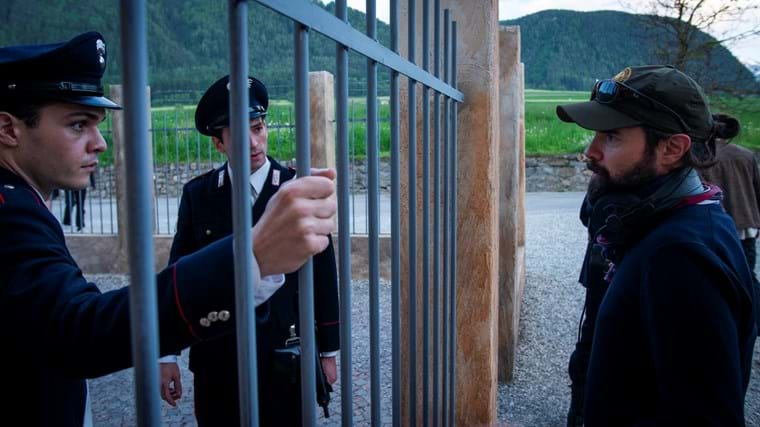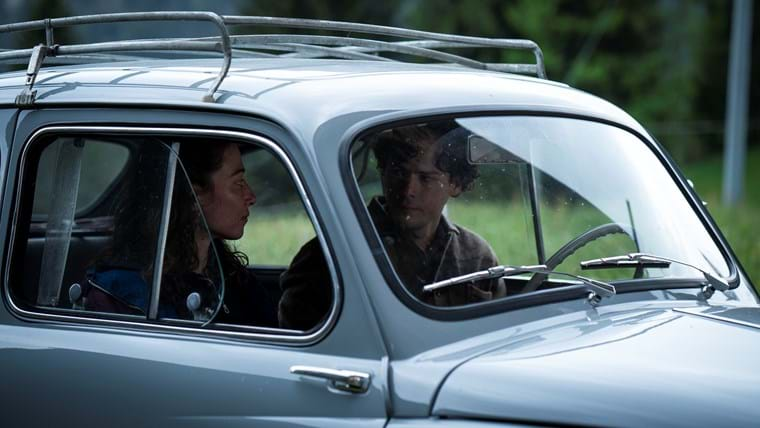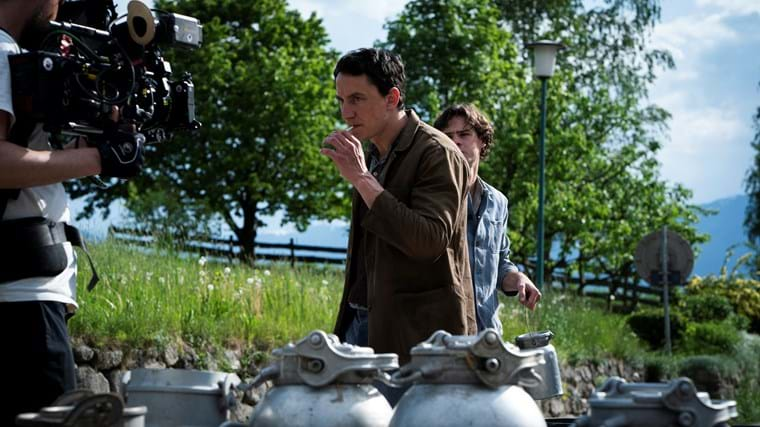Two brothers. One wife. Deadly bombings. A piece of South Tyrolean history shown by local director and screenwriter Michael Kofler. Zweitland is his feature film debut.
Anna is cleaning two large brass milk canisters as a police car struggles up the muddy driveway to the farm, finally coming to a halt. Loud rattling reverberates in the air, joining the squelch of the nearing footsteps of the two Carabinieri, an Italian police unit. The younger of the two, Alessandro, shoves a stack of envelopes in Paul’s hand. His superior, Maresciallo Lombardo, turns to Anna, her face not yet marked by age, with a brusque “Prima o poi si stancherà”: he’ll get tired sooner or later. The air is rife with tension as two worlds steeped in mistrust and animosity collide. The mountaintops of the Val di Funes Dolomites are shrouded in heavy, white clouds, providing the perfect, albeit gloomy ambience the situation calls for.
Violence that divides
Zweitland is set in 1961 South Tyrol, a time in which the province experiences a series of bombings which shake it to its very core. South Tyrol was ceded by Austria to Italy after World War I, and militant German-speaking South Tyroleans want the province to separate from Italy – even resorting to violence. These events do not yield the desired effect, as Italy decides to markedly increase the police presence in South Tyrol. The terrorists receive support from across the border, to the north of the Brennero Pass. A slice of local history which Val Pusteria-born director Michael Kofler, who also penned the script, depicts in his first feature film. One of the characters that sets the bombs is none other than Anton, Paul’s brother and Anna’s husband (played by Laurence Rupp of Netflix’s Barbarians). The young father flees to Austria, leaving his family behind – a family which distances itself from the fugitive and the escalating violence.
Michael Kofler already sketched out the idea of Zweitland in 2011 during the first edition of the IDM Film Commission Südtirol’s RACCONTI Script Lab. His script was awarded the first prize. Kofler says: “Nobody talked a lot about the years of the bombings as I was growing up. I got interested in the matter and, once I did, I couldn’t get it out my mind.” He currently lives in Munich but returned home to work on his film.

Both sides of the story
Zweitland serves as a canvas where the screenwriter paints a seminal moment of South Tyrolean history: the idea of identity, the coexistence between different languages, conflicts which tear apart families and villages, and the controversial question if the bombers are freedom fighters or terrorists all swirl densely on this canvas. The film does not set out to cover up or glorify anything. A precarious but necessary balancing act, according to director Kofler: “I do not see myself as someone who has to, or should, take a stance on this. What I believe is important is to show and understand both sides of the conflict.”
Anton’s wife, Anna – played by Aenne Schwarz, who received numerous awards for her role in All Is Well – is a teacher, a modern woman, a champion of the bilingual school system. She feels no sympathy whatsoever towards the attacks perpetrated by her husband. Thomas Prenn – two-time winner of the Austrian Film Award for Why Not You and Great Freedom – plays Paul, Anton’s brother. An introvert at heart and a talented artist, Paul has to face an impossible inner conflict as the Italian police exerts pressure so that he betrays his brother.
Three countries and challenging location scouting
Zweitland is produced by Munich-based Starhaus Filmproduktion (producers: Wasiliki Bleser and Rainer Kölmel) in collaboration with Helios Sustainable Films GmbH from Bolzano (producer: Martin Rattini) and KGP Filmproduktion from Vienna (producers: Gabriele Kranzelbinder and Barbara Pichler). The project is supported by FFF Bayern, BKM, the Austrian Film Institute, and the IDM Film Commission Südtirol. It will premiere in cinemas in 2024.
The film came with its own challenges. Martin Rattini, Helios, says: “It was incredibly difficult to find suitable locations which could accurately mirror a time, the 1960s, when South Tyrol was very poor.” Location Scout Kathy Leonelli, who doubled as the project’s Green Consultant, oversaw that aspect. Ultimately, they were successful, according to a glowing Rattini, also thanks to the work of set designer Martin Reiter and costume designer Monika Buttinger. Both have received numerous accolades for their work: Buttinger, for example, received the Austrian Film Award in 2023 for her work on Corsage.
The village scenes for Zweitland were shot in Gais. The scenes involving the prison and the Carabinieri unit were shot in the military barracks of Brunico; the other locations were Merano, Verano, Braies Vecchia, and Val di Funes. The film crew is currently getting ready for a scene on the Laseiderhof farm – which serves as Anton and Paul’s home, the Passlerhof farm, in the film – located near a thick fir forest at an altitude of 1,670 m. These are the last days of shooting.

Overcoming borders
The German conversations in Zweitland are in South Tyrolean dialect, which required Aenne Schwarz and Laurence Rupp to train with a language coach to learn the local vernacular. Francesco Acquaroli and Andrea Fuorto – who also star in Netflix’s Suburra: Blood on Rome – play the Carabinieri officers and, just like in the film, speak only Italian. English is spoken by the international team and cast on set.
The atmosphere is professional yet very laid-back: the director, Kofler, discusses the next scene with the actors. Is it a regular film? Most certainly not: Zweitland is the first-ever feature film which talks about the years of the bombings, featuring a South Tyrolean screenwriter-cum-director and a main actor from the same country, filmed entirely in South Tyrol. The film may focus on a moment in history, but it also represents a historical watershed moment of sorts: most of the cast and crew hails from three countries – Italy, Austria, and Germany – which were once at war with one another. During an interview with a local paper, Michael Kofler describes this as a unique experience: “It is great to see that where once borders existed, we now have teamwork.” And producer Wasiliki Bleser says that “it was clear to us from the very start that the film had to be a co-production between South Tyrol, Austria, and Germany. Having said that, the fact that our three main actors hail from those three production countries, which are closely woven together in this moment of contemporary European history – Thomas Prenn from South Tyrol, Aenne Schwarz from Germany, and Laurence Rupp from Austria … well, that seems like a stroke of luck even we could not have predicted.”
